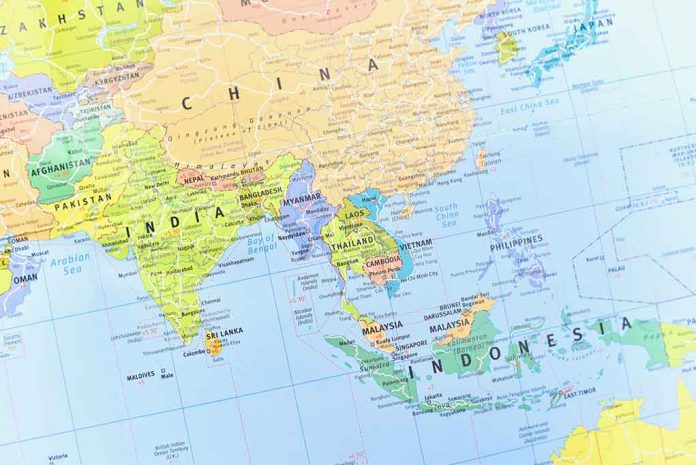
India bristles as Trump warmly receives Pakistan’s army chief at the White House, signaling a potentially troubling shift in regional alliances.
Key Takeaways
- Field Marshal Asim Munir’s high-profile reception in Washington, including a White House lunch, has alarmed Indian officials who view Pakistan as a terrorism sponsor.
- President Trump has demonstrated an unexpected warmth toward Pakistan’s military leadership, contradicting India’s expectation of preferential treatment as America’s primary South Asian ally.
- Prime Minister Modi has firmly rejected Trump’s claims about mediating peace between India and Pakistan, insisting that the ceasefire was initiated at Pakistan’s request.
- The US-Pakistan rapprochement appears driven by strategic interests including counter-terrorism cooperation, cryptocurrency investments, and Pakistan’s rich deposits of critical minerals.
- Pakistan’s geographic proximity to Iran may provide the US with strategic leverage in regional conflicts despite Pakistan’s domestic pro-Iran sentiment.
Unexpected White House Welcome Raises Alarms in New Delhi
The Trump administration’s dramatic warming of relations with Pakistan has set off diplomatic alarm bells across New Delhi. Field Marshal Asim Munir, Pakistan’s powerful army chief, received an exceptionally warm welcome in Washington last week, including a prestigious lunch at the White House and meetings with top US national security officials. This cordial reception marks a significant shift from years of frosty US-Pakistan relations and directly challenges India’s narrative of being America’s preferred partner in South Asia. The timing of this diplomatic outreach is particularly sensitive as India has consistently portrayed Pakistan as a state sponsor of terrorism.
The unprecedented access granted to Pakistan’s military leadership signals a potential recalibration of American strategic priorities in the region. President Trump’s personal engagement with Munir suggests a willingness to overlook previous tensions in favor of pragmatic cooperation on counter-terrorism, regional stability, and economic opportunities. For India, which has invested heavily in positioning itself as America’s natural democratic ally against China, this pivot toward Pakistan represents a concerning development that could undermine its regional security strategy and diplomatic standing.
Trump Has a Pakistan Problem. India's Patience May Be Running Out
Donald Trump’s erratic handling of the India-Pakistan conflict — from ceasefire claims to bizarre boasts about averting nuclear war — reflect not just poor judgment but a lingering free pass to Pakistan's terror… pic.twitter.com/gooOYFma8V
— News18 (@CNNnews18) May 22, 2025
Modi Rejects Trump’s Mediation Claims
Prime Minister Narendra Modi has publicly contradicted President Trump’s claims about American involvement in de-escalating tensions between India and Pakistan. Following Trump’s suggestion that he had personally mediated peace between the nuclear-armed neighbors, Modi firmly asserted that any reduction in hostilities occurred because Pakistan requested a ceasefire, not through external intervention. This unusually direct rebuttal highlights India’s sensitivity to any implication that its regional affairs require American mediation, particularly when it comes to its complicated relationship with Pakistan.
Modi’s response underscores India’s long-standing position that disputes with Pakistan must be resolved bilaterally without third-party involvement. The public disagreement reveals underlying tensions in the US-India relationship despite the outward appearance of strategic alignment. India’s leadership clearly feels compelled to maintain its diplomatic autonomy and resist any narrative that diminishes its stature as an independent global power capable of managing its own neighborhood without American supervision or interference.
Strategic Interests Driving US-Pakistan Rapprochement
Several key factors appear to be motivating the Trump administration’s renewed engagement with Pakistan. First and foremost is Pakistan’s demonstrated willingness to cooperate on counter-terrorism operations, exemplified by Islamabad’s assistance in apprehending a suspected architect of the Abbey Gate attack in Kabul. This practical cooperation provides tangible security benefits that transcend ideological differences or past grievances. Additionally, Pakistan’s strategic location bordering Iran makes it potentially valuable in any regional containment strategy, though Pakistan’s domestic politics limit how far it can participate in anti-Iran initiatives.
Beyond security considerations, commercial opportunities appear to be influencing this diplomatic reset. Pakistan possesses substantial deposits of critical minerals essential for advanced technology manufacturing and has positioned itself as an emerging hub for cryptocurrency development—both areas of particular interest to the Trump administration’s economic agenda. President Trump’s well-documented affinity for strong military leaders may also explain his personal chemistry with Field Marshal Munir, whose direct control over Pakistan’s security apparatus makes him an efficient partner for implementing bilateral agreements.
India’s Strategic Dilemma
India now faces a complex strategic dilemma as it watches its primary regional rival receive unprecedented American support. The Modi government has invested considerable diplomatic capital in portraying India as America’s natural democratic partner in Asia, particularly as a counterweight to China. The warm reception of Pakistan’s military leadership in Washington undermines this narrative and potentially weakens India’s regional standing. While India remains economically and militarily stronger than Pakistan, the introduction of enhanced American support could alter regional power calculations in ways that concern New Delhi’s security establishment.
The timing of this diplomatic shift is particularly problematic for India, which has worked diligently to isolate Pakistan internationally over terrorism concerns. Any legitimization of Pakistan’s government through high-profile American engagement directly contradicts these efforts. India must now carefully calibrate its response—pushing back firmly enough to protect its interests without damaging its own valuable relationship with the United States. This balancing act represents one of the most significant diplomatic challenges the Modi administration has faced in its dealings with the Trump White House.




